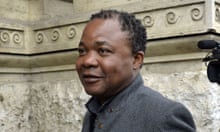The trial of Amanda Knox and her former boyfriend Raffaele Sollecito for the killing of British student Meredith Kercher has ended in a stunning acquittal after Italy’s highest court decided to annul their murder convictions.
The decision by a five-judge panel on Friday night to clear the pair definitively ends a case that began when the body of Kercher, a 21-year-old Leeds University student from Coulsdon, Surrey, was found in the bedroom of the flat she shared with Knox in Perugia on the morning of 2 November 2007. Her throat had been slashed and she had been sexually assaulted. She had been in the first weeks of an Erasmus year in the Umbrian hilltop town.
Knox said outside her mother’s home in Seattle on Friday night that she was “full of joy” following the court’s decision.
“I’m still absorbing the present moment, which is full of joy,” an emotional Knox told reporters, flanked by her family. “I’m grateful to have my life back.”
“Meredith was my friend,” she said, battling back tears. “She deserved so much in this life.”
Speaking earlier through her lawyer, Knox told the Guardian: “Throughout this ordeal, I have received invaluable support from family, friends, and strangers. To them, I say: thank you from the bottom of my heart. Your kindness has sustained me. I only wish that I could thank each and every one of you in person.”
The Kercher family, who just last year expressed confidence in the Italian justice system and said that an affirmative verdict would help them move on with their lives, were not in court for the verdict. Arline Kercher, Meredith’s mother, said late on Friday night that she was “surprised and very shocked” by the court’s decision.
Francesco Maresca, the lawyer for the Kercher family, said: “I think that it’s a defeat for the Italian justice system.”
The decision means that legally only one man is considered guilty of Kercher’s murder: Rudy Guede, a drifter from Ivory Coast who is nearly halfway through a 16-year prison sentence for her murder following a fast-track trial in 2008. At the time of his conviction, it was stated that he did not act alone.
Most legal experts had expected that both of the defendants’ prior murder convictions would be upheld, or that Sollecito alone would be granted a new trial because of weak evidence against him.
But the decision to acquit both underscored the persistent questions that surrounded the case from the moment the pair were arrested.
Lawyers for both Knox, 27, and Sollecito, 31, forcefully argued that the facts did not add up, that the evidence was tainted, that there was a lack of a clear motive, and that Italian investigators had pursued the case as if it were a witch-hunt.
The judges agreed: in their verdict, they did not just state that there was not enough evidence to convict the pair. They said that neither Knox nor Sollecito had killed Kercher. The full rationale behind the decision will be released within 90 days.
On Wednesday, the first day of the high court hearing, the chief prosecutor in the case asked the judges to uphold the verdict, saying that all the characters in the story fit together as part of a “perfect reconstruction”, like in a photograph by Henri Cartier-Bresson. But that argument was flatly rejected.
The judges reached their decision after 10 hours of deliberations. The presiding judge, Gennaro Marasca, read the decision – repeating the word “annulled” several times. Initially, the tense assembly of lawyers and journalists, including many who are not native Italian speakers, fell silent.
Then there was a burst of activity as many went racing out of the grand courtroom, ready to call in the news, even as journalists desperately looked at one another, wondering if their ears had failed them.
Giulia Bongiorno, Sollecito’s lawyer, who has solidified her reputation as one of the best defence attorneys in Italy, began screaming in joy and ran out of the courtroom, journalists chasing behind her.
When a seemingly stunned Carlo Dalla Vedova, the lawyer for Knox, came out of the courtroom behind her, she turned around and leapt into his arms and the two embraced. He had arrived shortly before the judges announced their decision, carrying his robe in a black gym bag.
Earlier in the day, Bongiorno had dramatically called for the annulment of the charges against her client, saying that Sollecito was a hapless victim of circumstance.
“He is an innocent who got wrapped up in spectacular and gigantic events that, like Forrest Gump, he did not fully realise. Absolve him,” she said in her final argument before the judges.
After the decision was read, Dalla Vedova remained calm, slowly walking down the corridor toward the lift. In a hushed tone he said that such a bold decision was nearly unprecedented. Indeed, he had largely dismissed such a result before the court of cassation hearing began in Rome, saying it was practically unthinkable.
Minutes later, he emerged from the court, which overlooks Piazza Cavour, and told the swarm of journalists that he had spoken to Knox and that she was “very happy”.
“It’s a fair verdict. It’s a victory of justice. This was a mistake from the beginning,” he said.
Both Knox and Sollecito have long claimed they were innocent.
The decision will be seen by some critics as an indictment of the Italian justice system. Knox and Sollecito served four years in prison before their initial 2009 convictions were overturned by an appeal court. Knox returned home to the US in 2011 as a free woman. But that decision was later vacated and the pair were found guilty of murder – again – by a court last year. If the court of cassation had affirmed that ruling, it would have left the pair with no other options.
Critics, particularly in the US, have said the trial and retrial smacked of double jeopardy, when a defendant is tried for the same crime twice. But Italian legal experts have defended their multitiered system, saying it provided protections both to the state, which can pursue a case even after an initial acquittal by a lower court, and defendants, who have several chances to retry their cases.
The decision allows Italy to avoid what might have been a messy diplomatic scuffle with the US. If Knox’s conviction had been upheld, Italy would likely have sought the extradition of the American university student to serve out the remainder of her 28-and-a-half-year prison sentence. The two countries share an extradition treaty that would have compelled the US to comply, with few allowable exceptions.
Although all the murder and sexual assault charges against the pair were dropped, the court did uphold one earlier conviction against Knox. It reaffirmed the charge that she had falsely accused her former boss Patrick Lumumba, a black pub owner, of murder. Lumumba was in jail for two weeks before he was exonerated. The charge carried a three-year jail sentence, but is moot because of the time Knox already spent in jail.
Earlier, Lumumba said he wanted an apology from Knox. He was the second victim in the crime, he said. The first, was “poor Meredith”.








Comments (…)
Sign in or create your Guardian account to join the discussion